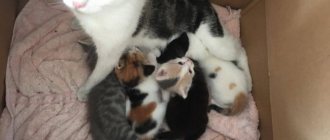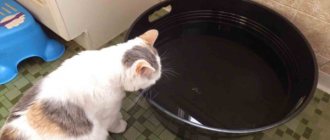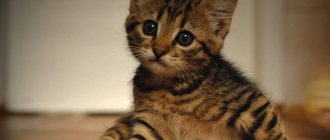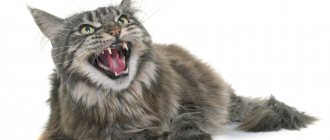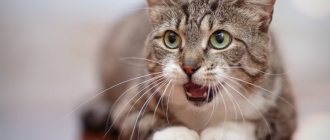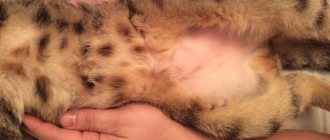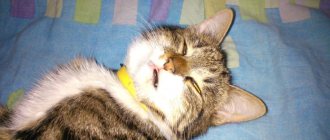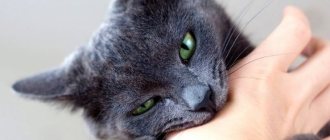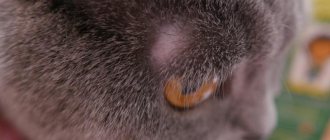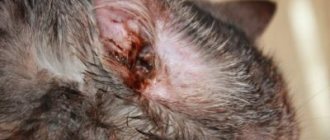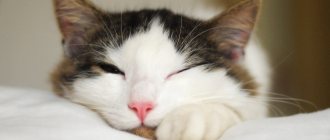If a cat refuses to eat and the animal does not feel well, this may indicate the development of a serious illness. But sometimes refusal to eat is triggered by less dangerous factors, such as stress, overwork and more. In any case, it is recommended to contact a veterinary clinic, where a specialist will conduct a comprehensive examination, examine the pet, find out the sources of the problem and tell you how to help a cat that refuses to eat.
What is anorexia
Anorexia in cats is a syndrome characterized by a complete lack of appetite. The condition usually refers to mental disorders, since hunger is a physiological instinct, and the desire to eat is a psychological stimulus. Anorexia in most cases is associated with diseases of internal systems and organs. It is extremely rare that the disease is considered idiopathic.
When making a diagnosis and drawing up a treatment regimen, it is important to distinguish anorexia from pseudoanorexia. The first is associated with a complete lack of appetite. With pseudoanorexia, the cat wants to eat, but cannot eat due to pain or mental disorders. This form develops, for example, in diseases of the oral cavity.
When does a cat, cat or kitten need urgent veterinary help?
Loss of appetite that lasts several days without signs of illness is not considered a pathology. Fasting is not dangerous if it lasts no more than a day in a kitten under six months of age, no more than 5 in an adult cat, no more than 2 in an animal with chronic diseases.
In case of refusal not only from food, but also from water, urgent action must be taken, because dehydration is very dangerous for the animal and quickly leads to a worsening of the disease. If the cat has not eaten or drunk anything for a day and has become lethargic and apathetic, he should be urgently shown to a doctor.
The help of a veterinarian is also necessary in cases where, in addition to lack of appetite, the following are observed:
- increased body temperature;
- vomit;
- diarrhea;
- purulent and inflammatory processes on the skin and in the oral cavity;
- blood in urine or stool.
You cannot do without a doctor if the onset of symptoms was preceded by injuries, burns, or poisoning with chemicals or toxic substances. Consultation with a veterinarian is required after bites from snakes, ticks, etc.
Signs of anorexia in cats
The key signs of anorexia are refusal to eat and rapid weight loss. In the true form of the disease, the animal completely loses interest in food and turns away from the bowl. With pseudoanorexia, the cat sniffs the food and may even taste it, but later spits out the pieces and leaves the same way.
To understand whether an animal is suffering from severe emaciation, you need to pay attention to the ribs, hips, shoulder blades and thoracic region: with significant weight loss, the bones protrude
When dehydration sets in, the animal becomes less active. In mild cases, it can look like fatigue after playing games. Later, the animal becomes passive and does not make contact.
There are 3 stages of dehydration: mild, moderate and severe. Fluid loss is up to 5%, from 6% to 10% and more than 10%, respectively.
Depending on the cause of anorexia, the syndrome may be accompanied by other symptoms. For example, with intestinal infections, diarrhea appears, and if internal organs are damaged, swelling and bleeding occur.
How many days without food is considered normal for cats?
Normally, fasting can last a different number of days depending on the reason:
- During the day, a cat can starve without harm to health in the hot season, while it consumes more water;
- also, no more than a day is considered normal fasting after moving;
- stress from changing ownership can also cause loss of appetite;
- meeting dogs on the street can become a stressful situation for a cat and also cause poor appetite;
- stress or manipulation performed by a veterinarian during a visit to the clinic can also affect the animal’s appetite;
- The cat may not eat for two days after anesthesia;
- during the release of hormones, the cat can eat on the third day;
- cats periodically refuse food and water altogether for several days during pregnancy.
For kittens
If a kitten under the age of six months is lethargic, does not play, sleeps a lot and has no appetite at all, then this is an alarming sign. The younger the animal, the faster all processes in its body proceed. For kittens under 6 weeks of age, going without food for even 12 to 24 hours can cause death. New owners often experience starvation of their pet when they take it home when it is two or three months old.
Reasons for fasting:
- too young and not ready for solid food;
- separation from mother;
- stress;
- change of home decor.
For cats and cats
If a young cat eats poorly for several days for no apparent reason and only drinks water, then most likely the animal is sick. He can cope with the infection, or there will be a remission of a chronic disease. Usually after this the owners stop worrying. But we need to fight not the symptoms, but the causes of the disease. To do this, it is imperative to contact a veterinarian, find out what exactly is happening to your pet and prescribe a course of treatment.
For a pregnant cat
While waiting for kittens, cats develop the following characteristics:
- Pregnant cats, like women, experience toxicosis. In the morning there is loss of appetite, nausea and vomiting.
- The pet becomes selective in food; she may be offered her favorite treats, but she refuses them. You need to buy specialized food for pregnant cats with a high content of micro- and macroelements.
- As the belly grows, pressure in the abdominal cavity increases and appetite decreases. From the 3rd week of pregnancy, the cat is fed 5-6 times a day in small portions. The food is wiped and soaked for absorption, and the amount of water is increased.
- When the cat refuses to eat at all, birth is expected soon.
- Refusal to eat in combination with fever, weakness and an unpleasant odor from the vagina of a pregnant cat is a reason to urgently consult a veterinarian.
For old cats
As cats age, their digestive organs wear out.
Typical diseases and problems appear:
- gastritis;
- enteritis;
- dysbacteriosis;
- diarrhea;
- constipation;
- change in stool color;
- vomiting, fasting;
- stomach ache;
- weight loss.
Should I contact a veterinarian?
It is impossible to give a definite answer to this question. The owner should independently assess the pet’s condition and determine the advisability of treatment. If the refusal of food is partial, and the cat turns away from food, but eats its favorite treats, it is recommended to delay providing help. Perhaps it’s a matter of selectivity, which occurs for various reasons: from stress and bad mood to sexual desire.
Physiological norm
The norm may be partial or short-term complete refusal of food in the following cases:
- Recently had treatment or surgery. Aggressive medications can cause temporary (up to 2-3 days) weakness. This often happens after taking antibiotics, because they destroy the local microflora. To mitigate their effects and speed up recovery, pro- and prebiotics can be used.
- Vaccination was recently rescheduled. Most drugs contain weakened but living pathogens, to which the cat’s body independently develops immunity. This requires the mobilization of all internal resources, which causes partial or complete loss of appetite. Interest in water continues. Normally, a cat may refuse food for 1–2 days.
- The cat is having a fasting day. Some animals voluntarily refuse food every 2–3 months for up to 2 days. It is assumed that this is done instinctively to normalize the functioning of the gastrointestinal tract.
- The cat is pregnant or nursing kittens. Voluntary fasting may be associated with the imminent onset of labor or simple fatigue after the birth of babies. The cat drinks water but does not eat well for 1–2 days.
- The animal is in heat. During sexual heat, the reproductive instinct becomes the main one, so throughout the entire period the cat may eat poorly and lose weight.
Refusal to eat due to a runny nose due to colds does not require urgent correction. Subject to adequate treatment of the primary pathology, the nutritional schedule gradually normalizes. The same applies to hunger against the background of discomfort not associated with diseases. For example, a cat may go hungry due to stress after moving.
Dangerous condition
The threat is posed by refusal of water for 12 hours or more, as well as complete fasting for more than 3 days. Dehydration is more dangerous than exhaustion and occurs more quickly, so it is important to be able to correctly assess your pet’s well-being. This can be done using the following methods:
- Checking gums. It is necessary to quickly move the lip away and inspect the mucous membranes. Normally they are moist and shiny. When dehydrated, the body conserves moisture, so drying out occurs. An additional symptom is a feeling of stickiness in the gums. Drying occurs with moderate and severe degrees of dehydration. In such cases, urgent intervention is required. It is important to quickly assess the cat's condition, because upon contact with air, moisture quickly evaporates, which makes diagnosis difficult.
Normal gums should be pink in color.
- Skin pulling. You should carefully pinch the withers or skin. The second is preferable, because the skin on the withers is thicker and recovers more slowly, but this option is better suited for owners of aggressive animals. Once the fold is released, it should immediately smooth out. A slight delay may indicate mild dehydration. The danger comes from slowly smoothing the skin or maintaining the same position.
The grip and pull should be noticeable but not painful.
- Measurement of capillary refill rate. When dehydrated, blood volume decreases, it becomes more viscous, so its circulation slows down. To check, you need to lightly press on the animal’s gum, then release it and count the time until the color normalizes. The norm is 1–2 seconds. Delay occurs with severe dehydration, which requires urgent intervention. The most dangerous thing is pale gums even at rest.
To indirectly confirm the diagnosis, you can feel the animal's paw pads. If dehydrated, they will be cold. In the absence of other signs, a low temperature in itself does not indicate the presence of a deviation.
It is necessary to contact a veterinarian if there are any other specific symptoms: vomiting, weakness, reddening of the gums, etc. Additionally, a visit to the clinic is required if the animal is extremely exhausted.
If a kitten has lost its appetite, the possible fasting time is reduced to 4–12 hours, depending on age. If a six-month-old animal can maintain normal health when refusing food and water for 12 hours, then dehydration develops rapidly in a newborn baby. Sometimes only 4–6 hours are enough for death or irreversible changes to occur.
What to do if you don’t eat or drink for a long time?
By drinking water, the animal will survive for 10 days. Without food and water, a cat will live a maximum of 6 days, depending on its age.
Kitty
Kittens are rescued in 2 ways:
- find a wet nurse - a recently lambed cat for surrogate feeding;
- fed from a syringe/bottle with an artificial mixture of diluted cat milk.
Adult cat or cat
You should not change food without the advice of a veterinarian. It needs to be heated, crushed and given in small portions. It is recommended to gradually switch to food for elderly pets, and to add a vitamin-mineral complex and vegetable oils to natural food.
The following are contraindicated for cats:
- salty;
- roast;
- fatty.
Catnip added to water stimulates appetite.
Diseases that are accompanied by refusal of food and water
Almost any pathology can cause partial or complete refusal of food and water. This most often occurs during exacerbation and the concomitant development of complications.
Pseudoanorexia often develops against the background of the following diseases:
- Gingivitis, stomatitis and other oral pathologies. In such cases, the cat wants to eat, but experiences pain in the process, so it refrains from eating. During a visual examination, it is possible to detect redness of the gums, tartar, ulcers, bleeding and other defects. To get rid of pain on its own, a cat may begin to chew hard objects. In this way, the animal tries to remove the problematic tooth.
Pink edges near the teeth are a characteristic symptom of gum disease.
- New growths on the tongue, tonsils or in the oral cavity. The tumors cause discomfort and may bleed. The main sign of disease is the presence of a neoplasm. It can be hard or soft, pink, white or black, depending on the type of pathology.
- Injuries and pathologies of the musculoskeletal system. In this case, refusal of food and water is associated with limited mobility. The cat becomes lethargic and inactive, moves little, limps, pulls its hind legs, etc.
With injuries and some diseases of the spine, the animal’s gait changes greatly, the most typical being failure of the hind legs
With pseudoanorexia, in all cases, appetite is not further adjusted. This is not necessary, since pets still have the desire to eat. In rare cases, with prolonged progression of the disease, negative associations are reinforced, but usually cats return to a normal diet within 2-3 weeks.
True anorexia can occur with many diseases: inflammatory, infectious, autoimmune, etc. We will note the most common causes.
Table: diseases that cause refusal of food and water
| Disease or condition | Characteristic symptoms | The need for treatment of concomitant appetite disorders |
| Internal organ injuries | Internal bleeding, blood in the stool (if the gastrointestinal tract is damaged), swelling and severe pain | No additional correction is required since this is an acute condition. The animal does not have time to lose much weight. Negative associations are not reinforced |
| Intoxication | Nausea, vomiting, drooling, digestive disorders | In most cases, it is enough to relieve intoxication, but in severe cases, intravenous fluid infusions are given and they switch to tube feeding |
| Lipidosis (accumulation of fat in the liver) | Lack of appetite for several weeks, rapid weight loss, diarrhea or constipation, vomiting, jaundice | Appetite correction is required. Many cats are malnourished, so they are offered high-calorie, high-protein foods. They try to carry out feeding in a familiar environment, eliminating stress factors. Correction is carried out until the animal begins to feed normally on its own. A probe can be used |
| Infectious diseases | Symptoms depend on the location of the pathology. Common signs include fever, weakness and pain | In most cases, no additional correction is required since this is an acute condition. After a short-term hunger strike and elimination of pathology, appetite normalizes on its own |
| Digestive tract diseases | Symptoms differ depending on the affected organ. If the functions of the pancreas are impaired, the digestibility of fats is impaired, and diarrhea is observed. With gastritis, body temperature sometimes rises. With most gastrointestinal diseases, the cat's gait changes: it hunches over due to pain | The need for additional correction depends on the condition of the animal. If the pet is not eating well even after the condition has returned to normal and has become very thin, a decision is made to change the diet. High-calorie gentle products can be used. For example, baby puree |
| Helminthiasis | With severe infection, worms are found in vomit and feces. A cat can lose weight even with an increased appetite. At some point, the animal refuses food due to a general deterioration in condition or intestinal obstruction | Discuss with veterinarian. In the absence of significant weight loss and short-term loss of appetite, the condition is not corrected. After using anthelmintic drugs in the absence of complications, appetite normalizes without third-party intervention |
| Any severe inflammatory processes | Symptoms depend on the type of disease. Often the animal’s appetite disappears due to pain during exacerbations of chronic pathologies | Depends on the condition of the animal. In case of long-term and severe course of the pathology, the pet during periods of remission may be offered more high-calorie food to restore normal physique |
| Impaired vision and smell | Loss of orientation in space. Smell disorders are detected through tests | In most cases, animals do not need strong correction. After therapy, the diet returns to normal. If it is impossible to treat the disease, owners are advised to use additional methods to improve appetite |
| Intestinal obstruction | Severe pain, vomiting, bloating. The stomach is hard. With partial obstruction, diarrhea is observed; with complete obstruction, constipation and absence of gas formation are observed. | If you contact a veterinarian in a timely manner, no additional measures are taken, since the animal does not have time to lose much weight |
Please note that these are only general recommendations. In each case, the veterinarian makes a decision individually, based on the pet’s condition. Even mild intoxication or antibiotic use can cause severe depletion in the absence of adequate care.
It also happens the other way around: with timely treatment and competent supportive therapy for gastrointestinal diseases, animals in most cases do not need separate treatment for anorexia. If a pet exhibits severe symptoms of dehydration or exhaustion, correction is necessary to prevent the occurrence of a critical condition.
The main reasons: what are they?
Impact of stress
When a young or older cat refuses to eat, owners should consider whether the pet has recently experienced fear or stress. A domestic cat that was playful just a week ago may suddenly become restless and not want to eat food. The development of stress in a cat can be affected by a recent move, rearranging the house, purchasing a new bowl, or renovation work accompanied by loud sounds. Under the influence of stress factors, the cat is apathetic, refuses to play, eats poorly and does not drink fluids.
Veterinarians do not recommend forcing your pet to eat during this period, and note that this condition goes away after a few days, and the cat should be surrounded with attention, care and love.
Imbalanced hormones
The period of estrus can affect the animal in this way.
The reason for refusing to eat and drink at a young age may be hormonal imbalance. A similar violation is recorded in individuals during the period of estrus. Pets with special sensitivities may experience food aversions in the week before sexual activity. This is due to the fact that a cat’s body spends a lot of energy and resources on sleeping and loud meowing, aimed at attracting a partner of the opposite sex. At the same time, the cat is active and does not show any symptoms of the disease. Owners should not worry, since at the end of estrus or at the beginning of it, the animal, as a rule, asks to eat.
Can a pregnant or lactating cat refuse to eat?
In the early stages of bearing kittens, the female wants to eat, but cannot, which is associated with nausea and vomiting. Normally, this condition lasts no more than a week, but if the cat continues to refuse to eat food, loses weight, often vomits, and experiences other unpleasant symptoms, then you should immediately contact a veterinary clinic. Such signs may indicate a serious disease, which during pregnancy poses a threat to the female and future kittens.
Diet changes
The animal may not accept the new food and may begin to starve.
If a kitten or old cat stops eating, this may be due to a sudden change in dry food. Veterinarians recommend switching from one diet to another gradually so that there is no stress on the cat’s body. In such cases, the cat often drinks only water and categorically refuses food. Changes in diet are difficult for cats, as a result of which they may go on a “hunger strike.”
Features of thermoregulation
If the cat is not as active as before and refuses to eat, then he may be very hot. This is more often observed in the summer or in winter in apartments with centralized heating. If thermoregulation is impaired, the cat does not eat, is weak, constantly lies down and does not want to play. A distinctive feature of this condition is unquenchable thirst, in which the pet often drinks a lot.
Parasite infestation
If an old cat refuses to eat, then the owners may suspect the activity of worms in the cat's body. Small parasites that live on the fur, skin or inside the animal have a negative impact, such as:
An animal's feeding behavior may change due to the activity of fleas.
- fleas;
- mites;
- helminths.
If there is a violation, the owners may notice that the cat has become lethargic, does not eat at all, and other unpleasant symptoms are recorded:
- diarrhea;
- gagging;
- elevated temperature;
- apathetic state.
How to recognize poisoning?
When a cat stops eating and vomits frequently, owners should be concerned, since such symptoms are typical for eating stale food or food of poor quality. Poisoning can be recognized by a number of signs:
- weakness throughout the body;
- trembling in the muscles;
- lethargy;
- increased secretion of saliva.
If cats stop eating due to poisoning and their condition rapidly worsens, then you should immediately contact a veterinary clinic. Toxic substances and chemicals pose a particular danger to the life of the animal.
Postpartum period: what is the problem?
Sometimes the female does this when she does not want to leave the newborn babies on their own.
In the first day after the birth of kittens, cats do not eat anything and may refuse to drink. This condition is influenced by the following reasons:
- the female does not want to leave the cubs;
- stress received during childbirth;
- desire to rest.
Refusal to eat during the postpartum period usually lasts 24 hours. If the cat’s condition does not stabilize during this time, then the owners should show the animal to a veterinarian. It is especially urgent to contact a veterinary clinic if the female not only refuses to eat solid or any other food, but also has heavy breathing, high fever, vomiting and diarrhea.
Possible diseases
If a cat refuses to eat, this may signal the progression of the following pathological conditions:
- Deviations in the oral cavity. Reluctance to eat any food in a young or elderly pet can be a consequence of pain in the mouth, which occurs against the background of caries, tartar, or incomplete dentition.
- A disease of a viral nature. Such diseases can be recognized not only by the cat’s refusal to eat, but also by high fever, sneezing and pathological discharge from the nasal passages.
- Impaired functioning of the kidneys and liver. If the internal organs are dysfunctional, the pet refuses to eat. In this case, force-feeding the cat is not the best solution; you need to contact a veterinarian and undergo medicinal treatment.
- Urolithiasis disease. The disorder is characterized by the formation of stones in the cat’s urinary system, against the background of which appetite disappears, urine excretion is disrupted, and other alarming signs are recorded.
Diagnostics
To determine the reason for refusing food and water, a medical history is first taken. It is advisable to try to independently determine whether the animal wants to eat or is not at all hungry. It is important for the owner to note the moment of behavior change. Every little thing matters. It is necessary to inform the veterinarian about what the animal previously ate. You should pay attention to new uncharacteristic habits. For example, one day my colleague began to complain that her cat began to chew her shoes. Several months have passed. She said that the cat began to eat less and lost weight. At first I didn’t connect these 2 facts, but then during a preventive examination the animal was found to have helminths and tartar.
In case of severe exhaustion and dehydration, the cat is given first aid and symptomatic treatment even before diagnosis is made.
After questioning and examination, blood and urine are taken from the pet for analysis. The results help to detect diseases of the genitourinary system or gastrointestinal tract, as well as confirm the presence of an inflammatory process. With dehydration, the number of red blood cells increases (more than 10). It is advisable to have your stool tested to detect helminth and protozoan eggs. If the cause cannot be identified, a PCR study is performed. It helps detect pathogens of infectious diseases.
If tests for infections and general analyzes turn out to be uninformative, an ultrasound of the abdominal organs and a chest x-ray are performed. Studies help detect pathological changes in soft tissues and the musculoskeletal system. It is possible to identify hidden injuries. If the presence of inflammation in the gastrointestinal tract is confirmed, a biopsy and gastroduodenoscopy can be performed.
Ways to improve appetite
Deterioration in appetite is partly due to poor psycho-emotional background. It may be caused by pain, stress or discomfort. After the disease is eliminated, the negative reaction and poor appetite persist due to developed habits. To normalize weight, it is recommended to improve the psycho-emotional background of the animal. To do this, the pet is placed in its usual conditions, visits from guests and other changes are avoided, and the cat is also given its own private corner. It is recommended to place bowls, toys and a house there. It is advisable to purchase a special cat tree: the animal will be able to climb up and monitor what is happening around.
Play complexes allow the cat to feel safe
To normalize the psycho-emotional background and disappearance of residual effects after treatment, the pet needs to be provided with peace. When my cat lost weight due to gastritis, I introduced an unspoken rule at home: while the animal is in its house, no one should touch it. Cats guard their territory and do not like it when someone invades their personal space. They are not as social as dogs and need a break from human attention. The situation was complicated by the presence of a small child: the playtime of the younger family members often did not coincide, and the cat became nervous. She even slept lightly, but after gaining personal territory, everything gradually changed. Not immediately, but her appetite improved. The cat began to sleep better, play more willingly and eat more.
After normalization of the psycho-emotional background, they begin to correct the diet. All cats are individual, so you have to experiment to choose the optimal food recipe or finished product. You can change not only the ingredients and their proportions, but also the texture and shape of the pieces. If there are diseases of the oral cavity, it is advisable to offer the cat softened food or rounded food pellets. This will reduce injury to the gums and mucous membranes. You can give your pet baby puree by spreading a small amount on his paw. This will cause a reflex, and the cat will begin to lick itself. In some cases, this improves appetite.
Any new food must be offered under familiar conditions for the animal. When in a stressful situation, a cat will most likely refuse unfamiliar foods. It is advisable to alternate new dishes with old ones, giving the animal a choice. You can add some wet food or canned food to your usual food. Most of them contain ingredients that improve the taste and aroma of food. In my case, I was able to persuade my cat to eat an extra meal using Monge wet food with tuna. I added 1 tsp to each portion, stirred thoroughly and placed the bowl in front of her while she licked herself. At these moments the cat ate more willingly.
To change the taste and smell of food, you can use special mixtures for cats. For example, under the Mnyams brand they produce a seasoning with barley, linseed oil, yeast and blueberries. An unusual novelty can arouse interest in the animal.
If none of the suggested methods help, the veterinarian may prescribe medications if necessary. The most commonly used means are:
- Apilak. Contains royal jelly. It has a general strengthening effect, improves metabolism and increases appetite due to the presence of vitamins, minerals and acids in the composition. Refers to gentle drugs. Possible adverse reactions are allergies and sleep disorders. The standard dosage is half a tablet 2 times a day. They can be crushed and mixed with baby food or any regular food with a liquid consistency.
- Pernexin. B vitamins are used as active substances. They increase appetite and improve liver condition. It is recommended to avoid taking the drug in case of diseases of the cardiovascular system and bleeding. The product is produced in liquid form in 100 ml bottles. The dosage is checked with the attending physician. It is recommended to give cats no more than 2 ml of the drug per day, otherwise hypervitaminosis may develop.
- Peritol. The drug blocks the functioning of receptors that signal saturation. The product stimulates the production of serotonin and histamine. The first allows you not only to increase your appetite, but also to improve your psycho-emotional background. The medicine is produced in the form of syrup and tablets. The syrup contains ethanol, so it is not given to cats. Reception begins with 1/8 of the tablet 2 times a day. The animal is monitored and the dosage is increased if necessary.
If gentle medications do not help, Valium may be prescribed. It is used only under medical supervision and in short courses, as it can cause problems with the liver and kidneys. The dosage is selected individually.
Prevention
Prevention of anorexia and water refusal consists of proper nutrition, avoidance of stressful situations and timely treatment of diseases. Many pathologies can cause these symptoms, so if any uncharacteristic signs appear, you should contact a veterinarian.
The cat must be switched to natural food or dry ready-made diets. Do not mix different types of food due to the risk of indigestion. The use of wet prepared foods is allowed, but they must alternate with granular products. Combining pates and dry rations into one feeding is also not allowed.
To maintain optimal condition, it is recommended that cats be given more red meat (beef and veal); chicken is a dietary variety
When eating natural products, 80% of the diet should be meat and offal. The rest is allocated to additives: vegetables and fermented milk. The menu should be varied. This allows the animal to receive different types of vitamins, minerals, amino acids and other beneficial substances. It is advisable to include chicken hearts, beef tripe, liver, fish, etc. in the diet.
Dry cat food should be at least super premium. Premium category products, when used for a long time, cause the development of metabolic disorders and pathologies of the gastrointestinal tract and kidneys. Economy class food is more dangerous because it contains a lot of salt and grains. If you have problems with appetite, it is important to consider the amount of ash in dry food. When I tried to switch my cat to Wellness Core dry food after her condition had normalized, she again began to sharply refuse to eat. It turned out that this is due to the high ash content - 9%. Conventionally, this indicator is considered the norm, but it is better to prefer 5–7%, otherwise the food will taste bitter.
How to help your pet at home?
In some cases, the problem can be dealt with at home. If the animal asks for food, but does not eat, it may not like the food or bowls that have not been washed for a long time. You need to offer your pet other food and wash the dishes. A cat may refuse to eat when it is hot; it must be taken to a cool place. Appetite often suffers during pregnancy, after operations and vaccinations performed under anesthesia, then nothing needs to be done.
If a cat or kitten is lethargic, sleepy and refuses to eat due to stress, you can alleviate their condition by showing attention and care: holding them in your arms longer, stroking them, talking affectionately. Distract your pet with games and physical activity. Purchasing new toys and play equipment can help.
Herbal sedatives are effective in treating stress: Kot Bayun, Bach drops, Fitex, Stop stress. They can be given during estrus, before a trip, a visit to the veterinarian, or the arrival of guests. If the depressed state persists for a long time, treatment with potent drugs is required. They are prescribed by a veterinarian; it is dangerous to use such products on your own.
Refusal of food, water, weakness and apathy are symptoms of many diseases, including life-threatening ones for animals and humans. The pet must be closely monitored. If other symptoms appear, attempts to cope with the situation at home may end in failure; you should urgently consult a veterinarian.
